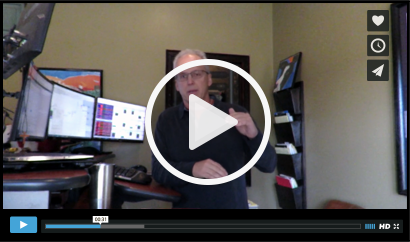We have received many questions concerning selling calls on long-term holds in order to generate cash for more purchases (or just for cash!) without losing the stock.
This can be done, but you have to get to know your stock and you need to know the market. We keep you up on the market’s moves and where it is going. You need to know the resistance and support levels of your stock, its average volume, how far it tends to run on moves up and down (often controlled by support and resistance), when it tends to move up and down (e.g., at earnings). You probably know this, you just don’t realize it. How many times have you said “XYZ stock always seems to hit 74 and then falls back. When it gets to 67, it always starts back up. Just can’t break 74, darn it.” Well, you have just described a cash generating machine. All things being equal, you can sell calls on your position when it hits 74 and starts to fall. It is important to make sure it is falling and does not break out of the range on you are playing. Check the volume on the move up; is it normal? Is it above average? If so, it could break out. In any event, see the turn down.
First, it is perfectly fine to trade covered calls in retirement accounts. We know of no brokers that say you cannot do it. If you have one, let us know as we would like to discuss it with them and direct you to some who will be happy to help you.
Second, some have asked about getting called out when you have sold a call and the stock shoots up unexpectedly. Although it can happen at any time prior to expiration, we have never been called out before expiration. Some cases we have been $20 in the money and were able to play the stock up and down when we thought the stock was going to have big intra-day swings. We did this on AOL once. When it would open low, we would buy the in the money calls back and then sell them later in the day when the stock ran up. As long as we closed the loop, i.e., sold the calls again, before the close that day, no money had to be added to the account. That way we were able to generate additional cash for the account buying and selling calls on a stock that we had originally sold calls on $20 earlier. At expiration we bought the calls back and sold the next month out at the same strike price. We could have sold a higher strike and thus closed the gap on how far in the money the calls were, but we felt the stock was going to fall further. It ultimately did (remember the fall from $170 to $90?). Of course, the best method is not to let the stock get that far in the money. Remember, hope rhymes with dope. That is why we never use up all of the cash in our accounts that we receive from selling calls. We may need a bit of it from time to time to square the account if a stock unexpectedly moves up on us.
Now at expiration, which calls are exercised on what stock is left to random assignment by computer. Thus it is possible that you would not get called out even if you sold calls and your stock ran up. Note, however, that most brokerages have a policy of exercising on calls that are a quarter of a point or more in the money-it stinks, but it is hard to get around. Ask your broker what their policy is.

